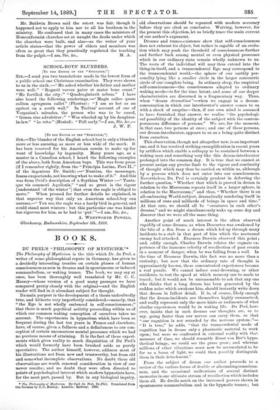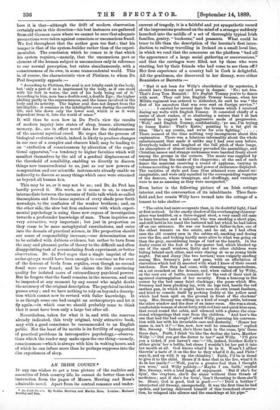BOOKS.
DU PREL'S "PHILOSOPHY OF MYSTICISM."* The Philosophy of Mysticism. is the title which Dr. du Prel, a writer of some philosophical repute in Germany, has given to a decidedly interesting treatise on certain phases of human consciousness as seen in dreams and in spontaneous or induced somnambulism, or waking trance. The book, we may say at once, has been thoroughly well translated by Mr. C. C. Massey—whose version of a good many passages we have -compared pretty closely with the original—and the English reader will find in it abundant subject for thought.
Its main purport is the development of a thesis undoubtedly true, and hitherto very imperfectly considered,—namely, that "the Ego is not wholly embraced in self-consciousness ;" 'that there is much psychical activity proceeding within us of which our common waking conception of ourselves takes no account. The experiments in hypnotism which have been so frequent during the last ten years in France and elsewhere, have, of course, given a fullness and a definiteness to our con- oeption of certain unconscious mental processes which we had no previous means of attaining. It is the fact of these experi- ments which gives reality to much disquisition of Del Prel's which would formerly have been brushed aside as purely speculative. The author himself, however, adduces most of his illustrations not from new and trustworthy, but from old and somewhat incomplete observations. No doubt these old observations are worth renewed consideration in view of our newer results ; and no doubt they were often directed to points of psychological interest which modern hypnotists have, for the most part, passed by. But in any biological inquiry,
• The Philosophy of Mysticism. By Carl du Prel, Dr„PhiL Translated from the German by O. 0. /Laney. London: Rodney. 7889.
old observations should be repeated with modern accuracy before they are cited as conclusive. Waiving, however, for the present this objection, let us briefly trace the main current of our author's argument.
Dreams and trance-existence show that self-consciousness does not exhaust its object, but rather is capable of an evolu- tion which may push the threshold of consciousness further and further back among mental or even physical processes which in our ordinary state remain wholly unknown to us. The roots of the individual will may thus extend into the thing-in-itself, and a transcendental Ego may correspond to the transcendental world,—the sphere of our earthly per- sonality lying like a smaller circle in the larger concentric circle of our complete being. In ordinary sleep, the empirical self-consciousness—the consciousness adapted to ordinary waking needs—is for the time latent, and some of our deeper characteristics are discerned in a fragmentary way. Thus, when " dream dramatises "—when we engage in a dream. conversation in which our interlocutor's answer comes to us with a shock of surprise—then, if our own mind is assumed to have furnished that answer, we realise "the psychologi- cal possibility of the identity of the subject with the contem- poraneous difference of persons." We are, for the moment, in that case, two persons at once; and one of these persons, our dream-interlocutor, appears to us as a being quite distinct from ourselves.
This observation, though not altogether new, is an important one, and it has received striking exemplification in recent years by artifices which enable a colloquy to be sustained between a waking man and something very like this dream-interlocutor prolonged into the common day. It is true that we cannot at present assign any precise limit to the vigour and continuity of thought which may thus be carried on within us, although by a process which does not enter into our consciousness. Nevertheless, Du Prel is certainly prudent in deferring the farther question, " Whether that which is proved in dream in relation to the Microcosm repeats itself in a larger sphere, in relation to the Macrocosm ;" and thus, " Whether there is an all-embracing World-'subject, dramatically sundering itself in millions of suns and milliards of beings in space and time." At that rate, we should all be " creatures in each other's dreams," and we might simultaneously wake up some day and discover that we were all the same thing.
Another point of much interest is the often observed rapidity of some dreams, as when Descartes was awakened by the bite of a flea from a dream which led up through many incidents to a stab in that part of him which the nocturnal enemy had attacked. Erasmus Darwin observed this point ; and, oddly enough, Charles Darwin relates the cognate ex- perience of the immense celerity of recollection of past events in a moment of danger, when he was falling from a wall. In the time of Erasmus Darwin, this fact was no more than a curiosity; but now that the ordinary rate of thought is approximately known, these concentrated experiences become a real puzzle. We cannot induce semi-drowning, or other accidents, to test the speed at which memory can be made to travel ; but it would not be unreasonable to ask that any one who thinks that a long dream has been generated by the sudden noise which awakens him, should instantly write down that dream in fullest detail. It is, of course, likely enough that the dream-incidents are themselves highly summarised, and really represent only the mere hints or rudiments of what
similar experiences would be in waking life. Du Prel, how- ever, insists that in such dreams our thoughts are, so to say, going faster than our nerves can carry them, so that " our cognition is not retarded by the nervous system :"— " It is true," he adds, "that the transcendental mode of cognition has in dream only a phantastic material to work upon; but were we confronted in external reality with that measure of time, we should resemble Ernst von Bur's hypo- thetical beings ; we could see the grass grow; and whereas millions of ether vibrations must now be accumulated to be for us a beam of light, we could then possibly distinguish them in their detachment."
From the subject of dream our author proceeds to a review of the various forms of double or alternating conscious-
ness, and the occasional unifications of several distinct memories in one ultimate stream of recollection which includes them all. He dwells much on the increased powers shown in spontaneous somnambulism and in the hypnotic trance ; but
here it is that—although the drift of modern observation certainly sets in this direction—his best instances are gathered from old German cases where we cannot be sure that adequate precautions were taken against conscious or unconscious fraud. We feel throughout that the author goes too fast ; that his temper is that of the system-builder rather than of the experi- mentalist. The conclusion which he comes to is that which his system requires,—namely, that the unconscious part or element of the human subject is unconscious only in reference to our normal perception, but exists simultaneously, with a consciousness of its own, in some transcendental world. This is, of course, the characteristic view of Plotinus, to whom Du Prel frequently appeals :-
" According to Plotinus, the soul is not totally sunk in the body, but • only a part of us is imprisoned by the body, as if one stood with his feet in water, the rest of his body being out of it.' According to him, man has a double soul, a double Ego ; the higher abiding partly in the supersensuous, and the lesser involved in the body and its activity. The higher soul does not depart from the intelligible ; it remains in the intelligible even during the earthly life, and lets down only the lower soul, which is as it were dependent from it, into the world of sense."
It will thus be seen how in Du Prel's view the results
of modern inquiry into states of sleep, trance, alternating memory, &c., are in effect novel data for the reinforcement of the ancient mystical creed. He urges that the process of
biological evolution (which, indeed, is likely to produce changes in our race of a complex and obscure kind) may be leading to an " exaltation of consciousness by alteration of the cogni- tional apparatus,"—a tendency to higher faculties which will
manifest themselves by the aid of a gradual displacement of the threshold of sensibility, enabling us directly to discern things now transcendental to us, just as our new powers of computation and our scientific instruments already enable us indirectly to discern so many things which once were esteemed as beyond all human ken.
This may be so, or it may not be so ; and Dr. du Prel has hardly proved it. His work, as it seems to us, is exactly intermediate between the torrents of futile talk which so-called theosophists and free-lance mystics of every shade pour forth' nowadays, to the confusion of the weaker brethren ; and, on the other side, the slow but firm endeavour with which experi- mental psychology is using these new organs of investigation towards a profounder knowledge of man. These inquiries are very attractive, very important ; but just in proportion as they cease to be mere metaphysical exercitations, and enter into the domain of practical science, in like proportion should our sense of responsibility increase,—our determination not to be satisfied with dubious evidence, but rather to turn from the easy and pleasant paths of theory to the difficult and often disappointing task of accumulating fresh experiment, or better observation. Dr. do Prel urges that a single imprint of the archmapteryx would have been enough to convince us for ever of the descent of birds from reptiles, even though no second fossil were ever found; and he claims the like convincing
quality for isolated cases of extraordinary psychical powers. But he forgets that the fossil remains in the museum, and can be inspected at any moment by any savant who might doubt
the accuracy of the original description. The psychical incident passes away ; and we have nothing to rely on beyond a descrip- tion which cannot now be revised with fuller knowledge. It is as though some one had caught an archmopteryx and let it fly again,—in which case we should probably come to think that it must have been only a large bat after all.
Nevertheless, taken for what it is, and with the reserves already indicated, this truly original, truly attractive book, may with a good conscience be recommended to an English public. Not the least of its merits is its fertility of suggestion of practical problems in introspective lisychology,—observa- tions which the reader may make upon the one thing—namely, consciousness—which is always with him in waking hours, and of which he can infuse more than he perhaps supposes into the dim experiences of sleep.



































 Previous page
Previous page